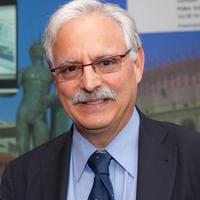
- Ph.D Universität Heidelberg, 1975
Office hours:
put office hour text here
Bernard Frischer is a leading virtual archaeologist and the author of seven printed books, three e-books, and dozens of articles on virtual heritage, Classics, and the survival of the Classical world. He is the founding editor of Digital Applications in Archaeology and Cultural Heritage, an innovative online, peer-reviewed journal where scientists can publish interactive 3D models.
Frischer received his B.A. summa cum laude in Classics from Wesleyan University (CT) in 1971 and his Ph.D. summa cum laude in Classics from the University of Heidelberg in 1975. He held a post-doctoral fellowship in Roman archaeology at the American in Academy in Rome from 1974 to 1976. Afterwards, he taught Classics and Roman Topography at UCLA from 1976 to 2004. From 2004 to 2013 he was Professor of Art History and Classics at the University of Virginia, where he was also founding Director of the Virtual World Heritage Laboratory. The lab’s mission is to apply 3D digital tools to simulating cultural heritage artifacts and sites as heuristic instruments of discovery. Since 2013 he has been a Professor of Informatics in the School of Informatics at Indiana University, where he continues to direct the Virtual World Heritage Laboratory.
He has been a guest professor at the University of Pennsylvania (1993), the University of Bologna (1994), Beijing Normal University (2009) and held the post of Professor-in-Charge of the Intercollegiate Center for Classical Studies in Rome (2000-01). Frischer is a member of Phi Beta Kappa, a Fellow of the Michigan Society of Fellows, a Fellow and trustee of the American Academy in Rome, and he has won research fellowships from the American Council of Learned Societies (1981, 1996), and the Center for Advanced Study in the Visual Arts (1997). Over the course of his career, he has garnered over $6 million in research funding, including multiple grants from the Andrew W. Mellon Foundation, the National Endowment for the Humanities, and the National Science Foundation.
From 1996 to 2003 he directed the excavations of Horace’s Villa sponsored by the American Academy in Rome, and from 1996 to 2004 he was founding director of the UCLA Cultural Virtual Reality Laboratory. The lab was one of the first in the world to use 3D computer modeling to reconstruct cultural heritage sites. Frischer has overseen many significant modeling projects, including Rome Reborn, the virtual recreation of the entire city of ancient Rome within the Aurelian Walls. Rome Reborn was the featured project at SIGGRAPH 2008, where it was prominently displayed at the entrance to the LA Convention Center. In recent years, he has focused on digitization and digital restoration of ancient sculpture, creation of a 3D restoration model of Hadrian’s Villa, and on using interactive models of historic monuments and the historically restored sky in archaeoastronomical research. His Virtual Meridian of Augustus Project is an example of the latter. Frischer not only develops scientific 3D models of cultural heritage, he also collaborates with The Khan Academy to use the models as assets in educational videos. With over 500,000 views since it was posted in 2012, the program he helped create on ancient Rome is by far Khan’s most popular arts and humanities video.
In 2005 Bernard Frischer was given the Pioneer Award of the International Society on Virtual Systems and Multimedia. In 2009, he was the recipient of the Tartessus Lifetime Achievement Prize from the Spanish Society of Virtual Archaeology. In 2010-11 he held the Senior Prize Fellowship of the Zukunftskolleg at the University of Konstanz, where since 2012 he has served as a member of the Scientific Advisory Board.
Classical Art and Archaeology; Classics
